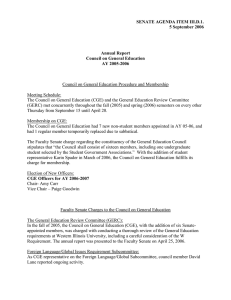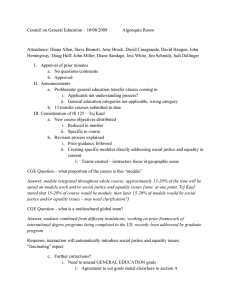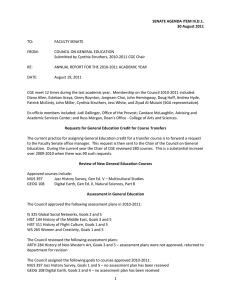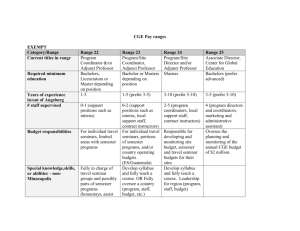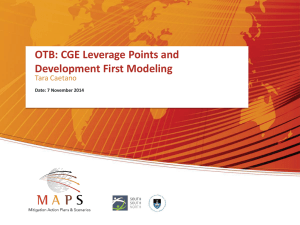SENATE AGENDA ITEM III.D.1. 31 August 2010 May 18, 2010
advertisement
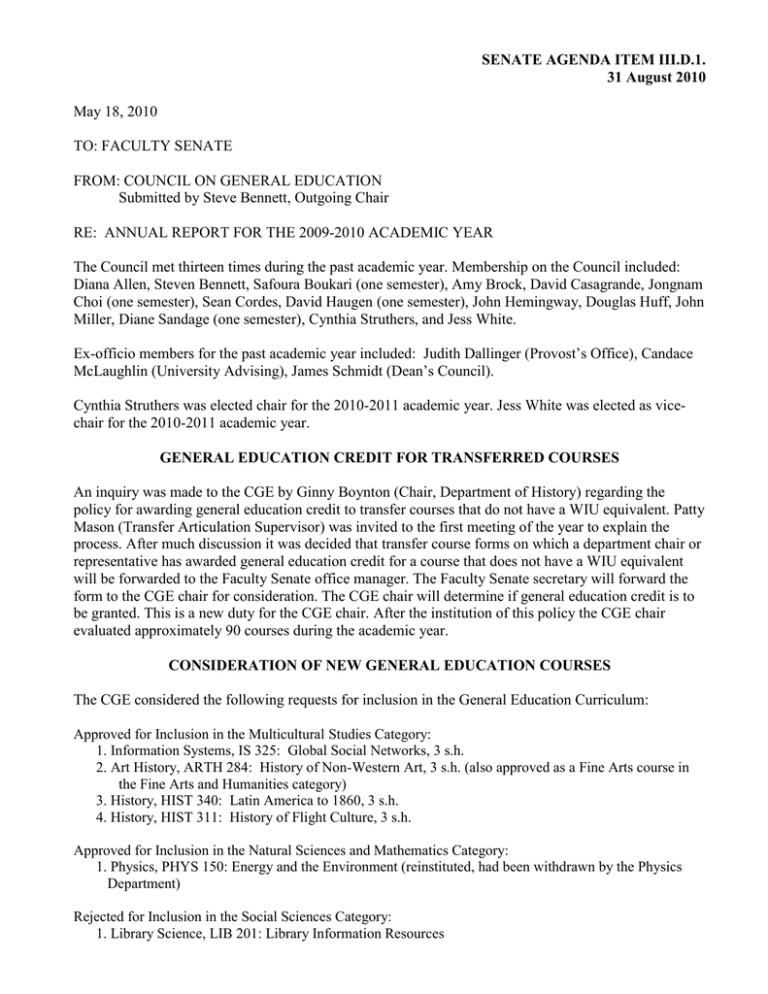
SENATE AGENDA ITEM III.D.1. 31 August 2010 May 18, 2010 TO: FACULTY SENATE FROM: COUNCIL ON GENERAL EDUCATION Submitted by Steve Bennett, Outgoing Chair RE: ANNUAL REPORT FOR THE 2009-2010 ACADEMIC YEAR The Council met thirteen times during the past academic year. Membership on the Council included: Diana Allen, Steven Bennett, Safoura Boukari (one semester), Amy Brock, David Casagrande, Jongnam Choi (one semester), Sean Cordes, David Haugen (one semester), John Hemingway, Douglas Huff, John Miller, Diane Sandage (one semester), Cynthia Struthers, and Jess White. Ex-officio members for the past academic year included: Judith Dallinger (Provost’s Office), Candace McLaughlin (University Advising), James Schmidt (Dean’s Council). Cynthia Struthers was elected chair for the 2010-2011 academic year. Jess White was elected as vicechair for the 2010-2011 academic year. GENERAL EDUCATION CREDIT FOR TRANSFERRED COURSES An inquiry was made to the CGE by Ginny Boynton (Chair, Department of History) regarding the policy for awarding general education credit to transfer courses that do not have a WIU equivalent. Patty Mason (Transfer Articulation Supervisor) was invited to the first meeting of the year to explain the process. After much discussion it was decided that transfer course forms on which a department chair or representative has awarded general education credit for a course that does not have a WIU equivalent will be forwarded to the Faculty Senate office manager. The Faculty Senate secretary will forward the form to the CGE chair for consideration. The CGE chair will determine if general education credit is to be granted. This is a new duty for the CGE chair. After the institution of this policy the CGE chair evaluated approximately 90 courses during the academic year. CONSIDERATION OF NEW GENERAL EDUCATION COURSES The CGE considered the following requests for inclusion in the General Education Curriculum: Approved for Inclusion in the Multicultural Studies Category: 1. Information Systems, IS 325: Global Social Networks, 3 s.h. 2. Art History, ARTH 284: History of Non-Western Art, 3 s.h. (also approved as a Fine Arts course in the Fine Arts and Humanities category) 3. History, HIST 340: Latin America to 1860, 3 s.h. 4. History, HIST 311: History of Flight Culture, 3 s.h. Approved for Inclusion in the Natural Sciences and Mathematics Category: 1. Physics, PHYS 150: Energy and the Environment (reinstituted, had been withdrawn by the Physics Department) Rejected for Inclusion in the Social Sciences Category: 1. Library Science, LIB 201: Library Information Resources ASSESSMENT IN GENERAL EDUCATION In the area of assessment generally of general education, the Council fulfilled its responsibilities according to the University Plan of Assessment for General Education and submits the following report on assessment in general education. 1. The “Request for Inclusion in General Education” form was revised to both clarify the portion of the form regarding goal assessment and add a place for the CGE to immediately assign the goals to be assessed in the course (pending approval of the Faculty Senate). 2. A summary of the results of the general education assessments conducted during the Fall 2009 semester was provided by Judi Dallinger of the Provost’s Office. Some departments (Art, Biology, RPTA) did not complete their assessments or did not complete them in the requested format. Other departments/courses were not submitted by the assigned deadline (Theater and Dance, Eng 180, Eng 280). Judi Dallinger followed up with these courses to insure that a workable assessment plan is in place for the Spring 2010 general education assessment. 3. Working with Judi Dallinger and the Provost’s Office, the CGE identified courses that had been approved for inclusion in the General Education Curriculum after approval of GERC report (August 2008) for which general education assessment plans had not been developed. Seven courses were identified. The status of their assessment plans is as follows: A. BAT 300, Global Study, 1-9 s.h. No assessment plan, have been assigned goals 3 and 5. B. REL 110, Introduction to Eastern Religions, 3 s.h. Assessment plan was approved. Will assess goals 3 and 5. C. REL 111, Introduction to Western Religions, 3 s.h. Assessment plan was approved. Will assess goals 3 and 5. D. HIST 144, History of the Middle East, 3 s.h. No assessment plan, have been assigned goals 3 and 5. E. IS 325, Global Social Networks, 3 s.h. No assessment plan, have been assigned goals 2 and 5. F. ARTH 284, History of Non-Western Art, 3 s.h. No assessment plan, have been assigned goals 3 and 5. G. HIST 340, Latin America to 1860, 3 s.h. Assessment plan submitted and approved pending some clarification. Will assess goals 3 and 5. H. WS 265, Women and Creativity, 3 s.h. Assessment plan submitted and returned for some revision. Will assess goals 1 and 5. I. HIST 311, History of Flight Culture, 3 s.h. No assessment plan, have been assigned goals 1 and 5. WRITING IN GENERAL EDUCATION The Council continued its ongoing survey of writing in general education. The report of the Council’s Committee on Writing is as follows. Background Among other duties, the Council on General Education (CGE) reviews the General Education Curriculum in order to insure that the curriculum reflects Western Illinois University's philosophy and goals of general education. In the fall of 2005, the Faculty Senate charged CGE, along with six additional Senate-appointed members, with conducting a thorough review of the General Education requirements at Western Illinois University, including a careful consideration of the W Requirement. After meeting for the better part of a year, the General Education Review Committee (GERC) recommended eliminating the W requirement, and noted there has always been an expectation that general education courses include writing. Courses with an enrollment of 50 or fewer students should have at least one written assignment with written or oral feedback from the instructor with an opportunity for revision. Courses with an enrollment of over 50 students should at a minimum write short informal essays or responses to the course material that do not require feedback from the instructor. The Faculty Senate and President Goldfarb approved the final report of the General Education Review Committee in October 2007. Accordingly, CGE has taken on the responsibility of periodically reviewing general education courses to determine the amount of writing taking place throughout the general education curriculum. After considerable discussion of the alternatives for soliciting information, including reviewing syllabi, the council determined that the most effective and least burdensome method for faculty would be an online survey. CGE reported the results of the first survey in Spring 2008. That first survey had a response rate of 46%. In order to increase the response rate, the committee decided to ask fewer questions about various writing assignments and to conduct the survey every third semester. The second survey, conducted in Fall of 2008, yielded a response rate of 59%. The report below presents the results of the third and most recent survey, which CGE conducted in Spring of 2010. Survey Description Every instructor who was teaching a general education section during the Spring 2010 semester (with the exception of English 180 and 280) was invited to participate in the online survey. The survey required about 10 minutes to complete, and was intended to elicit the following information: whether the section being surveyed had more or less than 50 students whether the section being surveyed was a First Year Experience a rough estimate of the number of pages of writing assigned how frequently writing is assigned whether an opportunity for revision with feedback was included in writing assignments Summary of Results Of the 293 faculty invited, 191 responded. This represents a response rate of about 65%, which is very good, and represents an improvement over the 59% response rate the previous year and 46% the first year. A total of 205 courses were analyzed. We should note that some faculty taught more than one course. Of the courses surveyed, 44 (23%) were First Year Experience (FYE) sections, 126 were nonFYE sections with less than 50 students, and 35 were sections with more than 50 students We cannot know if instructors who do not respond are less likely to respond because they do not require writing. Therefore, we cannot estimate with confidence exactly how much writing is being required throughout the curriculum. However, we can use these data to monitor trends, including the impact of efforts to educate instructors about writing requirements. The council was originally concerned that large sections would be less likely to include writing. This appears not to be the case. Of those who responded to this year's survey, 91% of sections with more than 50 students require at least some writing. This result is identical to our previous survey. Of these, 80% required more than two pages of assignments and 27% offered opportunity for students to revise assignments. The Council was surprised to learn in 2008 that 39% of small sections (50 students or less) were not providing opportunities for students to revise, that 7% are requiring one page of writing or less, and most importantly, that 7% of small sections are requiring no writing at all. At that time we initiated education efforts about writing expectations as described below. In this most recent survey, 48% of small sections were not providing opportunities for students to revise, 6% are requiring one page or less, and 5% of small sections are requiring no writing at all. These results suggest no improvement in overall writing, and a decrease in opportunities for revision. This being the first survey conducted after initiating education efforts, it is too early to determine if our efforts have failed or additional measures should be taken. This is the first year we collected data specifically for FYE classes. All FYE sections reported requiring some writing, with 95% requiring two or more pages. However, only 60% of FYE courses provide opportunities to revise writing based on feedback. Recommendations The full council discussed the results of this and last year's survey and recommended the following: Continuing to repeat the survey every three semesters using this semester’s survey questions Using data to determine trends in writing; in particular, to determine the effectiveness of the council's efforts to educate faculty about the writing requirements via emails and the new website. In particular, the next survey will allow us to make stronger conclusions about trends over time. An email message sent by the CGE chair to the deans of all colleges that contribute to the general education curriculum with the results of the last two writing surveys and a request to ask them to remind their chairs of the general education writing requirements. Additional education efforts focused on improving the number of small sections that require writing, especially writing with the opportunity for students to revise assignments. Past education efforts include this survey itself, the CGE website, and a Tele-STARS message sent by the CGE chair reminding general education instructors of writing requirements two weeks before the beginning of each semester. Other possibilities include CITR workshops and incorporating writing in departmental general education assessments. If the next survey indicates no improvement in writing in small sections, stronger measures should be considered.
